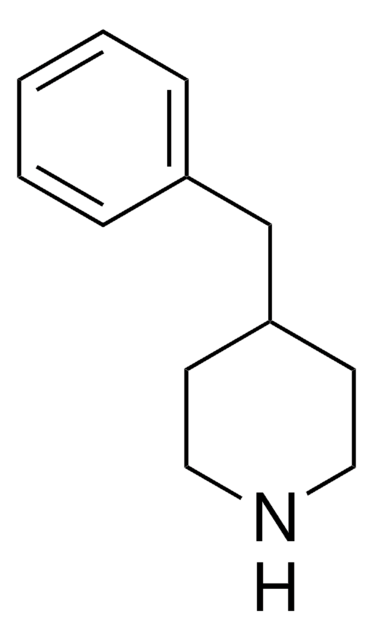All Photos(1)
About This Item
Empirical Formula (Hill Notation):
C11H15N
CAS Number:
Molecular Weight:
161.24
Beilstein:
124508
EC Number:
MDL number:
UNSPSC Code:
12352100
PubChem Substance ID:
NACRES:
NA.22
Recommended Products
Quality Level
Assay
97%
mp
61-65 °C (lit.)
functional group
phenyl
SMILES string
C1CC(CCN1)c2ccccc2
InChI
1S/C11H15N/c1-2-4-10(5-3-1)11-6-8-12-9-7-11/h1-5,11-12H,6-9H2
InChI key
UTBULQCHEUWJNV-UHFFFAOYSA-N
Looking for similar products? Visit Product Comparison Guide
Related Categories
Signal Word
Warning
Hazard Statements
Precautionary Statements
Hazard Classifications
Eye Irrit. 2 - Skin Irrit. 2 - STOT SE 3
Target Organs
Respiratory system
Storage Class Code
11 - Combustible Solids
WGK
WGK 3
Personal Protective Equipment
dust mask type N95 (US), Eyeshields, Gloves
Choose from one of the most recent versions:
Already Own This Product?
Find documentation for the products that you have recently purchased in the Document Library.
Customers Also Viewed
P Singh et al.
Journal of enzyme inhibition, 16(4), 331-338 (2002-03-28)
Two series of compounds were recently reported as novel alpha1a-selective adrenoceptor antagonists. In the first series, a dihydropyrimidone moiety is attached to a 4-phenyl piperidine containing side chain, while in the second, it is linked to a 4-substituted phenyl piperazine
Xing-hai Wang et al.
European journal of medicinal chemistry, 41(2), 226-232 (2006-01-13)
A nonlinear QSAR study was conducted on a series of 4-phenylpiperidine derivatives (4PPs) acting as mu opioid agonists by three-layer back-propagation neural network (NN) method. At first a variety of molecular descriptors were calculated and then selected with two-stage least
Clandestine drug synthesis.
W H Soine
Medicinal research reviews, 6(1), 41-74 (1986-01-01)
Diane K Luci et al.
Bioorganic & medicinal chemistry letters, 17(23), 6489-6492 (2007-10-16)
Various 4-phenylpiperidine-benzoxazin-3-ones were synthesized and biologically evaluated as urotensin-II (U-II) receptor antagonists. Compound 12i was identified from in vitro evaluation as a low nanomolar antagonist against both rat and human U-II receptors. This compound showed in vivo efficacy in reversing
R A Glennon et al.
Journal of medicinal chemistry, 34(12), 3360-3365 (1991-12-01)
sigma receptors may represent an exciting new approach for the development of novel psychotherapeutic agents. Unfortunately, many of the commonly used sigma ligands lack selectivity (e.g., many bind at phencyclidine or dopamine receptors) or suffer from other serious drawbacks. Recently
Our team of scientists has experience in all areas of research including Life Science, Material Science, Chemical Synthesis, Chromatography, Analytical and many others.
Contact Technical Service







![Benzo[b]thien-2-ylboronic acid ≥95%](/deepweb/assets/sigmaaldrich/product/structures/251/077/d0ead874-b533-4dcb-890d-8816a0018ccd/640/d0ead874-b533-4dcb-890d-8816a0018ccd.png)


![9-Azabicyclo[3.3.1]nonane N-oxyl 95%](/deepweb/assets/sigmaaldrich/product/structures/287/155/e2f4a2e1-1d4e-4bed-9187-9e16d23cbbbf/640/e2f4a2e1-1d4e-4bed-9187-9e16d23cbbbf.png)

